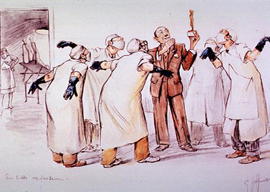
May 23, 2012

Gaston Gaston 1883
In a few years, when confidentiality agreements with clients are less of a stumbling block for him, Manzi should revisit this material, aiming at the broader business market instead of Uncontrolled‘s tiny target audience of Reihan Salam‘s highbrow conservative friends such as David Brooks, Ross Douthat, and Tyler Cowen.
As a public policy book, Uncontrolled tries to answer the perennial question: What’s wrong with the social sciences? To Manzi, the problem is too many studies and not enough experiments.
For example, Manzi points out that the evidence for Levitt’s popular theory in Freakonomics that legalizing abortion in 1973 caused crime to fall in the later 1990s is doubtful. In fact, Manzi notes, it’s largely based on a programming blunder Levitt made.
But Manzi doesn”t have a suggestion for how his RFTs could have helped: randomized abortions? Moreover, as I pointed out to Levitt years before Uncontrolled in our debate at slate.com (apparently our names have since been redacted), he”d been negligent in checking the historical record. (Originally, Levitt plumb forgot the crack wars.) But many influential people seemed to wish Levitt’s story was true.
Manzi says the golden age of government-funded social-policy experiments was the late 1960s into the early 1980s. But he misses why social scientists lost enthusiasm for testing: Trials of progressive programs such as Head Start and the negative income tax turned out depressingly. What good social science has revealed”that parents matter, genes matter, race matters, sex matters, and IQ matters”is the opposite of what the vast majority of social scientists wanted to discover.
Ironically, social science has been quite successful at demonstrating the failures of social engineering.